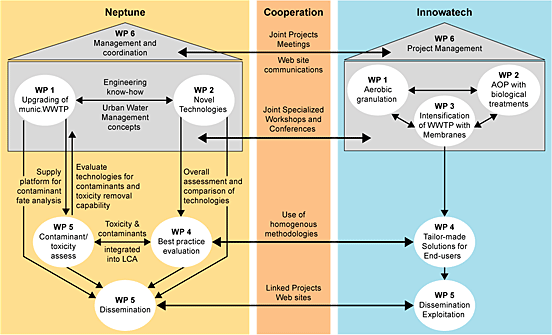Project Summary
The scope of sewage treatment is changing: Up to date municipal wastewater treatment plants (WWTP) were seen as an end-of-pipe treatment just before discharge, having the aim to avoid eutrophication and hygienic health hazard in surface water. Due to the global demographic trends as well as new legislations (e.g. the Water Framework Directive, WFD) increased focus is put on quantity and quality of effluents: more and more seen as interface between sanitation and environment, WWTP are delivering resources to the environment and for human activities (recharge of drinking water reservoirs, recycling of nutrient, efficient energy use). This focus shift has implications on the quality goals set for WWTP products:
|
|
|
| Existing focus: | New focus: |
|
|
|
|
|
|
|
|
|
|
NEPTUNE will approach these tasks by focusing on technology solutions allowing to meet present and future standards via upgrading of existing municipal infrastructure (new control strategies with online sensors; effluent upgrading with oxidation, activated carbon or wetland treatment; safe sludge processing and reuse) as well as via new techniques (fuel cell applications; new oxidation processes; production of polymer and phosphate from sludge). By including pathogens and ecotoxicity aspects into life cycle assessment studies (LCA), the project is helping to improve the comparability of various technical options and propose a suitability ranking.
WWTP are the major pollutant point source for surface water, and consequently impact on the new focus legislated by the WFD. The emerging interest on organic (eco-)toxic compounds requires characterizing treated effluent and treatment technologies concerning ecotoxicologic aspects and micropollutants. NEPTUNE is contributing to this discussion by ecotoxicity assessment and micropollutant fate studies.
By directly involving European players of the water management sector, the generated know-how is expected to contribute to the export oriented knowledge based EU eco-industry. Further NEPTUNE will contribute to sustainable growth in the EU by helping to remove the barriers faced by new environmentally friendly integrated solutions, a) by covering knowledge gaps of new solutions and b) by evidencing pros and cons of technologic alternatives through direct comparison.
Coordination between Neptune and Innowatech Projects
In the same call of Neptune the project Innowatech (Innovative and integrated technologies for the treatment of industrial
wastewater) has been approved. Such a project, is
really complementary to NEPTUNE as it deals with
innovative technologies for treating industrial wastewater.

Since dissemination and public access of the gained
knowledge is one of the main goals of both INNOWATECH and NEPTUNE
projects, the following activities will be jointly coordinated between the two
projects:
- activity coordination during joint project meetings (as long as the meetings agenda contains common points of interest) and by internal web site communications;
- results dissemination through the set up of two dedicated projects websites (each project will have its own web-site where a link to the other project will be active);
- knowledge transfer during specialized workshops and/or conferences jointly organized possibly simultaneously to evaluation steps of the projects;
- coordinated involvement of potential end-users and stakeholders by internet fora.